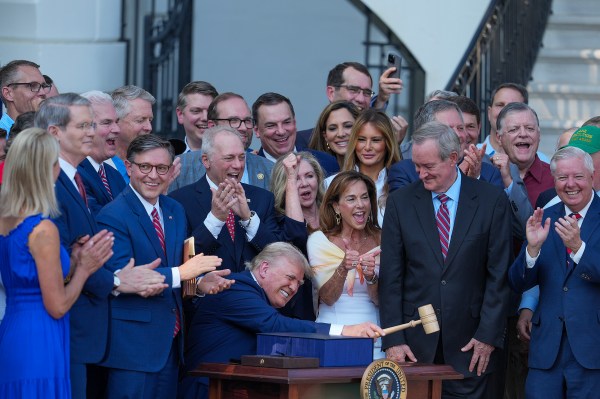Congress returns to session today after a monthlong recess during which Republicans have devoted some of their time working to convince voters that their One Big Beautiful Bill Act is, well, beautiful.
With Congress out of session as usual during the month of August, Republicans hit the road to pitch President Donald Trump’s key second-term legislation to constituents. Thus began their work to turn public opinion on the bill to their side before the 2026 midterm elections.
“This is arguably the most important work month on our calendar. Why? Because our members go home,” Speaker of the House Mike Johnson said at the last House GOP leadership press conference before the August recess. “They connect with their constituents in person. They host roundtables with local businesses and organizations. They meet with community stakeholders and local officials—really, really important components of the job. And frankly, they need to cut through the false and misleading claims about the One Big Beautiful Bill from the media and the Democrats.”
Selling the tax-and-spending-cuts legislation has proven a difficult task. A Pew Research poll from early August found that 46 percent of Americans disapprove of the bill while just 32 percent approve. Trump himself said he was going to stop calling the legislation the “One Big Beautiful Bill” at his August 26 cabinet meeting, saying the name obscured the extension of his 2017 tax cuts, plus the addition of new ones. Whatever the president prefers to call it, there are a couple of different strategies that Republicans have used to sell the legislation, which contains both Trumpian populist policies aimed at the working class and business-friendly policies geared toward spurring economic growth.
Republicans in the swing state of Michigan, for example, have touted the populist pieces that Trump proposed on the 2024 campaign trail to the working-class voters that propelled him to victory in November. Those include no tax on tips and overtime and allowing people to deduct their interest payments on loans for new cars assembled in the United States. For Rep. Tom Barrett, a Republican who represents a swing district based in Lansing, selling the bill meant breaking it down into specific parts and tailoring his messaging according to his audience.
“I think that if we talk about the critical components within the bill, they each poll very, very high with large constituencies of people,” Barrett told The Dispatch in an interview. He said that while speaking to his voters he emphasized taxless tips to service workers and no tax on overtime to construction workers. In August, he welcomed Small Business Administration head Kelly Loeffler to his district, where she joined the congressman in meeting with local business owners and workers. She was one of several Cabinet members who traveled outside the Beltway to promote the legislation.
Former Rep. Mike Rogers, the presumptive Republican nominee for Michigan’s open Senate seat in 2026, made a similar populist pitch.
The populist policies Barrett touted are friendly to working families and will “mean more opportunity, better jobs, higher pay—and more money in their pocket,” Rogers told The Dispatch. He also noted the importance of extending the tax breaks from the 2017 Tax Cuts and Jobs Act (TCJA) that were set to expire at the end of the year. “Stopping what is, matter of fact, the largest middle-class tax increase in the history of the country was absolutely paramount to get done,” he added.
Just as important are provisions, made permanent in the legislation, under which small businesses can accelerate depreciation—meaning that businesses can gain tax advantages for assets. Under the TCJA, deductions for equipment purchases began phasing out in 2023. “I can’t tell you how important that is for new employment opportunities in Michigan,” Rogers said.
The tax breaks contained in the bill have been among its most popular provisions. A Washington Post-Ipsos poll from June found that a majority of American adults supported extending the TCJA deductions, at least for individuals who earn less than $200,000 a year. Sixty percent of respondents supported no tax on tips, though only about 3 percent of households are set to benefit from the policy.
But Democrats have also—successfully so far—seized on parts of the legislation that are unpopular with Americans, namely the changes it makes to Medicaid and SNAP food benefits. While people support work requirements in order to receive Medicaid, they dislike the fact that such requirements would lead to a substantial number of Medicaid beneficiaries losing coverage and oppose measures that could lead to local hospitals losing funding. They also oppose reducing funding for food assistance programs, such as SNAP, by a margin of 43 points, according to the Post-Ipsos poll.
“Mike Rogers supports a law that literally takes money out of the pockets of working families and gives it to millionaires like himself,” Michigan Democratic Party Chair Curtis Hertel said on a press call in August. “In our state, this means hundreds of thousands of Michiganders are now at risk of losing their health coverage. For a working mom, that could mean losing Medicaid coverage that helps her cover her child’s asthma medication or their SNAP benefits that keep them from going hungry.”
Rogers responded to attacks on the bill by highlighting the working-class-friendly policies and accusing Democrats of being out of touch with blue-collar Americans.
“It's nonsense. … They say this every two years and every four years and every six years of an election,” he told The Dispatch. “What is the impact for people who are actually getting up every day, putting their kids on the bus, and going to work all day? That’s who is going to benefit from this particular bill, and they wouldn’t know that because I don’t think they talk to those people anymore.”
Barrett pushed back against the idea that the bill was a tax cut for the wealthy. “The top tax bracket in the United States right now is 37 percent,” he said. “The top tax bracket after this bill was passed still is 37 percent, so billionaires have no change in their status—as working people are getting a child tax credit, no tax on overtime, no tax on tips, no tax on Social Security if you’re a senior citizen on a fixed income.”
Other Republicans across the country have made similar pitches. Rep. Lisa McClain, a Michigander who serves as the House GOP Conference Chair, embarked on a three-day tour with vulnerable Republicans in Pennsylvania and New Jersey to sell the bill. She said the legislation was “pro-growth, pro-working family, pro-America, pro-defense, Make-America-First,” according to the Wall Street Journal. However, many voters who spoke to the Journal did not know about the bill or did not think it benefited them much.
Meanwhile, some Republicans have chosen to emphasize the business-friendly measures in the bill more common to a Reaganite GOP. Virginia Gov. Glenn Youngkin welcomed Energy Secretary Chris Wright on August 21 to Newport News’ Jefferson Lab, which researches nuclear physics and materials science. Wright was on the Trump Cabinet’s OBBBA tour, and his visit came ahead of a November gubernatorial election in which Republicans are trying to hold on to the governor’s mansion despite the absence of Youngkin, who can not run for consecutive terms, from the ballot.
During their visit, Wright and Youngkin participated in a roundtable with various business leaders in Virginia. Though he noted the bill’s benefits for small businesses and ordinary Virginians, Youngkin also touted provisions that allow for complete expensing of manufacturing construction costs. He noted pharmaceutical company AstraZeneca’s recent announcement that it would build a new plant in his state. “They were very excited to build their largest manufacturing facility in the world in Virginia, and they get to expense all of it right out of the box,” he said.
Wright noted later that while the legislation reduced incentives from the 2022 Inflation Reduction Act for green energy credits, nuclear energy stands to benefit.
“We spend government money and we make energy more expensive,” Wright said. “That makes no sense. But yet, there is expenditures in the bill to help launch nuclear, to help launch reliable industry that’s been strangled by our government, to let it fly free again.”
What's gone unaddressed—even by fiscally conservative members of Congress—as Republicans promote provisions in the bill is the impact of the tax cuts on the budget deficit. In addition to their attacks on the social assistance cuts, Democrats have pointed out that the tax breaks in the bill carry a heavy price tag. The Congressional Budget Office estimates that the OBBBA will add $3.4 trillion to the deficit over 10 years, and a majority of Americans agree that it would increase the debt, according to Pew. Although experts from across the ideological spectrum have affirmed the office’s general reliability, Republicans cast doubt on the CBO’s projections. Asked by The Dispatch about the bill’s impact on the debt, Youngkin likewise doubted the modeling.
“You absolutely have to recognize that the economic growth that will come from the One Big Beautiful Bill and the rest of the Trump agenda will drive GDP growth, will drive jobs, and will drive much more revenue into the system than I think the forecasters are currently using,” he said.







Please note that we at The Dispatch hold ourselves, our work, and our commenters to a higher standard than other places on the internet. We welcome comments that foster genuine debate or discussion—including comments critical of us or our work—but responses that include ad hominem attacks on fellow Dispatch members or are intended to stoke fear and anger may be moderated.
With your membership, you only have the ability to comment on The Morning Dispatch articles. Consider upgrading to join the conversation everywhere.